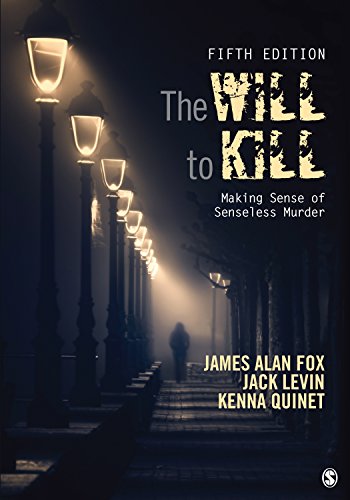The Will To Kill
James Alan Fox is the Lipman Family Professor of Criminology, Law, and Public Policy at Northeastern University. He has published 18 books, dozens of journal and magazine articles, as well as hundreds of freelance columns in newspapers around the country, primarily in the areas of multiple murder, youth crime, school and campus violence, workplace violence, and capital punishment. As a member of its Board of Contributors, his opinion column appears frequently in USAToday. Fox led the investigation of Seattle’s Capitol Hill mass shooting and was part of the task force investigating the serial murder of college students in Gainesville, Florida. He also served on President Clinton’s advisory committee on school shootings, and a Department of Education Expert Panel on Safe, Disciplined and Drug-Free Schools. In addition, he has been retained as an expert witness/consultant in several mass shooting cases, including the recent massacres at the First Baptist Church of Sutherland Springs, Texas, and the Marjory Stoneman Douglas High School in Parkland, Florida. Fox is one of the principals in maintaining the Associated Press/USA Today/Northeastern University Mass Killing Database. Finally, he has received several awards and honors for his work, including the Hugo Adam Bedau Award for excellence in capital punishment scholarship. ... Read more Read less
“Written in an engaging manner that challenges critical thinking throughout, the text is very readable and balances providing facts grounded in research with case examples.” —Minna Cirino, Shenandoah University Now with SAGE Publishing, The Will to Kill: Making Sense of Senseless Murder explores extraordinary and seemingly inexplicable cases of homicide—not to sensationalize them—but to educate students about these crimes. Authored by renowned experts, the Fifth Edition places recent crimes in context by reviewing current homicide laws, introducing the latest theories that seek to explain murder, and presenting up-to-date statistical data that identify homicide patterns and trends. Students develop a foundational understanding of a variety of topics, for example, domestic and workplace homicide, cult and hate killings, murders committed by juveniles, and serial slayings. Students also examine various criminal justice responses to homicide, including the strategies and tactics employed to apprehend, prosecute, and punish killers. New to the Fifth Edition Up-to-date research and data offers students the latest statistics on homicide patterns and trends in recent years. New illustrative cases cover various forms of homicide, focusing on crimes that drew significant interest from the public and policymakers alike and provide students with unique insights into violent behavior. Updated coverage of recent controversies, legislative changes, and Supreme Court decisions includes heightened concern over mass shootings, hate-motivated homicide and terrorism; new laws, shifting policies, and Supreme Court rulings pertaining to gun rights, juvenile offenders and the death penalty; and advances in surveillance technology, computer-aided investigation, and DNA forensic testing. Early introduction of theories helps students to understand the definition of homicide/homicide laws before developing a theoretical framework to explain violence. Instructors: Sign in at study.sagepub.com/fox for access to curated content contributed by the text’s authors, including links to articles and opinion pieces written by the authors. ... Read more Read less











